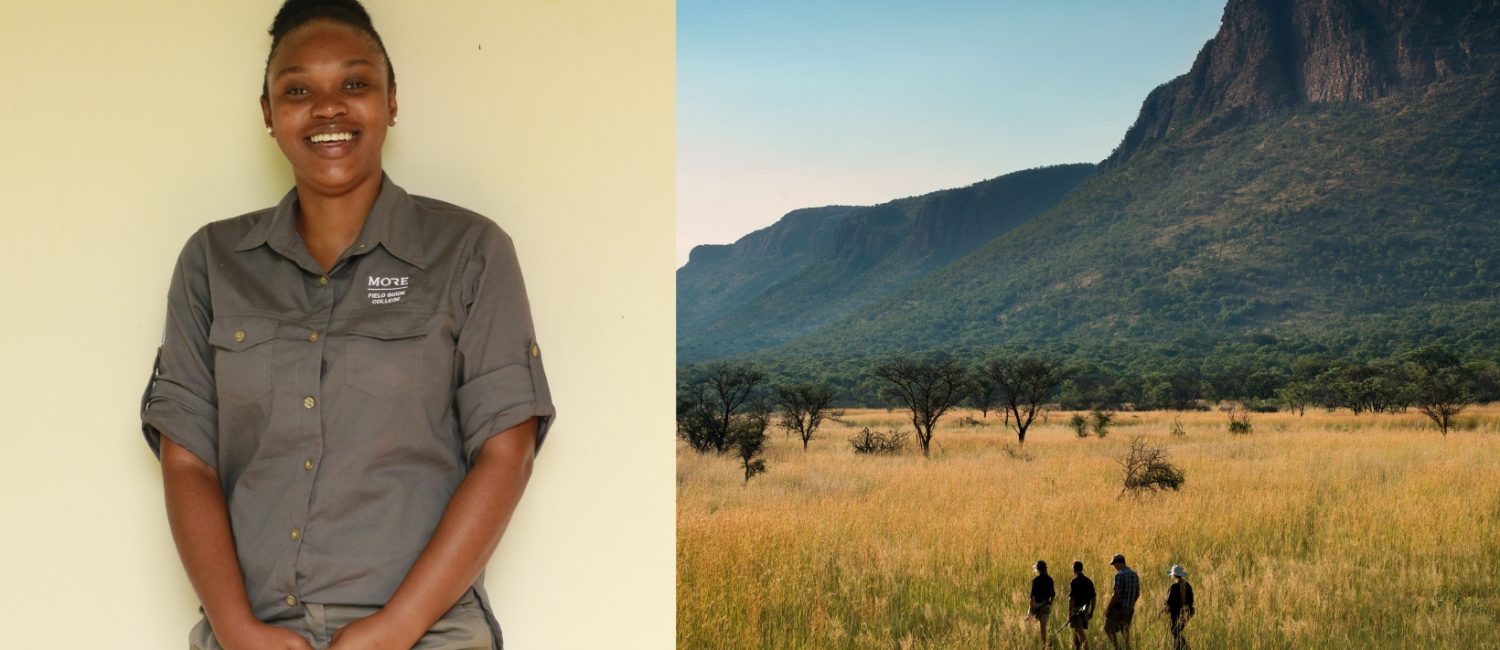Faith Shivamba joined the team in 2022 as Camp Manager at the NJ MORE Campus ensuring smooth operations and supporting the students. Faith was born in the tropical town of Tzaneen and nature has always been a part of her upbringing. “It was through my seasonal visits into the Kruger National Park with my parents, that made me realise that a career within nature would be a perfect fit.”
After high school Faith took a gap year, after which she went on to study Nature Conservation at the University of Nelson Mandela (previously known as Saasveld). “I obtained my Diploma in conservation in 2015 and immediately started working, which enabled me to gain so much experience and skills in the field. In 2017 I decided to register with the Field Guide Association of Southern Africa (FGASA) to do my Field Guide level 1. I managed to gain this qualification in six months together with my 4×4 advanced driving skills.”
Nine years in the bush, gaining invaluable experience in research, guiding, camp management as well as marketing, with a motto that one can never stop learning and growing. “I believe that nature is as gentle as you treat it, and we need to constantly learn and improve in our skills.”
We asked Faith a few questions and loved her answers, especially the riveting elephant encounter.
– What is your favourite animal and why?
My favourite animal is a cheetah – because I feel like a lot of their abilities resembles my own character. For instance, cheetahs are very focused animals, they know how to avoid danger. Cheetahs are built for speed and their ability to change direction quicky and return to high performance is amazing.
– What is your most memorable wildlife/nature experience?
My most memorable wildlife experience was during my time as research assistant at Global Vision International (GVI) at Karongwe Game Reserve in the lowveld. We had a student from one of the training providers, there to do her placement after six months of her NQF2 theory. Before we could allow an intern to go on research drives alone, we had to at least train them for a few weeks. We needed to make sure that their driving is good as well as their dangerous game encounter approach.
One afternoon, it was my turn to go out on drive with her. She told me she had been to every big five sighting except for an elephant. We heard them being called in on the northern side of the reserve and decided to approach. When we got there, we decided to park in the riverbed for a better view. This was a very rare and fascinating sighting of elephants. Some were trying to lift a baby that fell and couldn’t get up, others were feeding, and on the left-hand side we had one uneasy young male pacing up and down.
After a good 20 minutes, they started to look really irritated and I suggested it was time we left the sighting. Just as I said that one young male came rushing down from the top of the bank towards us and another game viewer. The elephant went towards the other game viewer, and we moved off in the other direction. We struggled to get up the bank because of the sand, and our only way out was in the direction of the irritated male. We tried all the tricks in the book to get up, but we failed. I asked her to move forward, to turn the vehicle so we can move upwards as we were driving in reverse. By the time we got in a position to move up, the elephant was charging towards us at full speed. I was so scared, but I needed to maintain my calm because I had a student in training, and any mistake can have negative consequences. We then switched off the vehicle and I maintained direct eye contact with this furious elephant, and I started talking to it. The elephant stopped behind the vehicle, came to the side, looked at us, shook its head and walked away. We immediately drove away and called the sighting a closed lock, so that other game vehicles wouldn’t approach. We drove for a good 10 km from the sighting, parked the vehicle, took a deep breath and started laughing about how close that was. This was a scary, yet amazing encounter because I got to see different sides of elephant behaviour in just that one sighting.
– What do you love most about working with the students?
We get to engage with different people from all over the world, people with different backgrounds, culture, and beliefs, which honestly makes one feel like having travelled the world as well. I love to sit and share my bush experiences with them and most importantly, I really like to see them flourish and grow during their time with us. You get students that did not know what the importance of an ecosystem is and how everything coexists in nature, but by the end of their course they have a different mindset, attitude, and belief toward nature. Students also teach me more about myself, pushing me to continuously learn because of all the different questions they ask.
– What conservation action are you most passionate about?
Environmental education – I believe that children are the future, and they are the ones that hold the key to a better tomorrow. For us to change our world, we need to educate the younger generation for good and better results. We cannot teach an older person a new way of doing things, but we can teach a younger person the best way and it will be embedded in their minds forever. I have spent three of my career years teaching learners the importance of conserving and preserving natural resources. I really loved seeing young people taking part in environmental measures, with pride.

